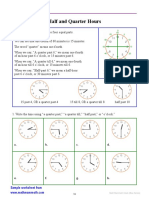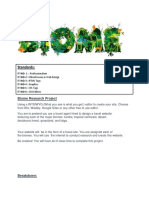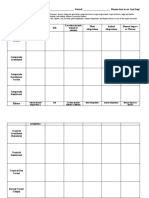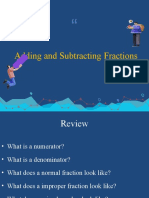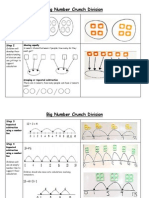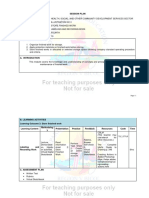Make Math Fun
Make Math Fun
Uploaded by
api-321408429Copyright:
Available Formats
Make Math Fun
Make Math Fun
Uploaded by
api-321408429Original Description:
Original Title
Copyright
Available Formats
Share this document
Did you find this document useful?
Is this content inappropriate?
Copyright:
Available Formats
Make Math Fun
Make Math Fun
Uploaded by
api-321408429Copyright:
Available Formats
Make Math Fun!
Why Play Math Games?
Rutherford, K. (2019). Why Play Math Games? - National Council of
Teachers of Mathematics. [online] Nctm.org. Available at:
https://www.nctm.org/publications/teaching-children-
mathematics/blog/why-play-math-games_/ [Accessed 5 Mar. 2019].
People of all ages love to play games that are fun and motivating. Games give students
opportunities to explore fundamental number concepts, such as the counting
sequence, one-to-one correspondence, and computation strategies. Engaging
mathematical games can also encourage students to explore number combinations,
place value, patterns, and other important mathematical concepts. Further, they afford
opportunities for students to deepen their mathematical understanding and reasoning.
• Playing games encourages strategic mathematical thinking as students find
different strategies for solving problems and deepen their understanding of numbers.
• When played repeatedly, games support students’ development of computational
fluency.
• Games present opportunities for practice, often without the need for teachers to
provide the problems.
• Games have the potential to allow students to develop familiarity with the number
system and with “benchmark numbers” (such as 10s, 100s, and 1000s) and engage in
computation practice, building a deeper understanding of operations.
• Games support a school-to-home connection. Parents can learn about their
children’s mathematical thinking by playing games with them at home.
21 Fun Math Games
This site contains many games to practice basic math facts. You will
need to print some of the materials and you will also need some
dice, a deck of cards and some counters ( beans, bingo chips or
Lego pieces would all work). These are quick games that you can
play while you cook supper!
The Game that is worth 1000 Worksheets
This site describes how to play the basic version of Math War but
it also offers several variations to target various operations and
skill levels. All that is required is a basic deck of cards, some scrap
paper and a pencil. It is the perfect game to tuck into your purse to
kill time at the hockey rink or at the restaurant!
Youcubed: 6 Ways to support your child’s Mathematical
Development
This website has tips for parents on what you can do at home to
support your child. One of their biggest take home messages in
their tips section is for parents NOT to share with your child that
you might have disliked math or that you weren’t good at it.
Rather encourage your child to have a growth mindset towards
math.
Another great tip is to incorporate number sense discussions
whenever you can. Tell kids how you might add 29+56 (change to 30+55). Ask them
about numbers that you see when driving around ( e.g. The speed limit on the
Westside hill was 60 km/h, but normally it is 100km/h. Can you tell me 3 numbers
that would be in between 60 and 100?) You can also ask them about fractions when
baking (e.g. What does the 2 mean in half a cup? Is ¼ cup bigger or smaller than ½
cup?).
Peter Pig’s Money Counter ( APP)
Students ages 5-8 lean to identify, sort and count
CANADIAN currency. They also learn how to make
purchases within a budget and put money aside
for savings.
Photomath (APP)
If you are trying to help your kids solve math questions but are a
little rusty on some of the procedures, upload this APP to your
phone. This APP will solve most numeric math problems and will
then explain how they arrived at that solution. Brilliant! You have to
see it to believe it!
You might also like
- Grade 8-Lesson Plan PropagandaDocument8 pagesGrade 8-Lesson Plan PropagandaIvy Grace Munda67% (33)
- Math Week 27 Practice Quiz and Week 28 Warm-UpDocument2 pagesMath Week 27 Practice Quiz and Week 28 Warm-Upapi-26375992050% (2)
- Geometry ReviewDocument26 pagesGeometry ReviewRocket Fire100% (1)
- Compost KidsDocument19 pagesCompost KidsJennifer Kupershlak0% (1)
- Science Fair Workbook 4-6Document18 pagesScience Fair Workbook 4-6api-290847859100% (2)
- Half and Quarter Hours: Sample Worksheet FromDocument1 pageHalf and Quarter Hours: Sample Worksheet Frommarucina100% (1)
- Eureka Math-Tips For Parents-Grade 2 Module 3Document2 pagesEureka Math-Tips For Parents-Grade 2 Module 3L WadeNo ratings yet
- Critical Thinking Lesson by SlidegoDocument55 pagesCritical Thinking Lesson by SlidegoShahida HamidNo ratings yet
- Rdy Ccss Math Gr7 Ratios Involving Complex Fractions 19498Document50 pagesRdy Ccss Math Gr7 Ratios Involving Complex Fractions 19498JenonymouslyNo ratings yet
- ATSEP BSC TrainingDocument2 pagesATSEP BSC TrainingDertyh KuhtlerNo ratings yet
- Read UK: Chinese New Year - Exercises: 1. Check Your Understanding: True or FalseDocument2 pagesRead UK: Chinese New Year - Exercises: 1. Check Your Understanding: True or FalseDominic Nguyen100% (1)
- Biome Research ProjectDocument3 pagesBiome Research Projectapi-472648158No ratings yet
- Unit 4 Weather and ClimateDocument10 pagesUnit 4 Weather and Climatelasole210% (2)
- CloudsDocument2 pagesCloudskarasuilyas123No ratings yet
- Holidays Around The World Unit PlanDocument6 pagesHolidays Around The World Unit PlanniprantNo ratings yet
- Geometry 2nd GradeDocument9 pagesGeometry 2nd Gradeapi-290816995No ratings yet
- Slope Intercept Form BattleshipDocument3 pagesSlope Intercept Form BattleshipKathryn Belmonte100% (1)
- Biome Summary TableDocument2 pagesBiome Summary TableMrs. Marsha O'HareNo ratings yet
- Place ValueDocument27 pagesPlace Valueapi-235646201No ratings yet
- Earths BiomesDocument2 pagesEarths Biomesapi-265042537No ratings yet
- Multiplication and Division Using Units of 4: Mathematics CurriculumDocument2 pagesMultiplication and Division Using Units of 4: Mathematics CurriculumAkiraNo ratings yet
- Adding and Subtracting Fractions PowerpointDocument17 pagesAdding and Subtracting Fractions PowerpointEva Majan BuenaobraNo ratings yet
- Connected Mathematics 2 - Filling and Wrapping - Three-Dimensional MeasurementDocument87 pagesConnected Mathematics 2 - Filling and Wrapping - Three-Dimensional MeasurementIulia Rosu100% (1)
- Decimals 1 Adding Decimals With HundredthsDocument4 pagesDecimals 1 Adding Decimals With Hundredthsapi-249283966No ratings yet
- Big Number Crunch Division: Step 1Document6 pagesBig Number Crunch Division: Step 1kevintconlonNo ratings yet
- EOG Math VocabularyDocument3 pagesEOG Math VocabularyshannonchildressNo ratings yet
- 3rd Grade - Liquid Measurement WorksheetDocument2 pages3rd Grade - Liquid Measurement WorksheetTotally3rdGrade100% (20)
- Counting The Rice - Place Value ActivityDocument2 pagesCounting The Rice - Place Value ActivityHastings55No ratings yet
- Kumon HistoryDocument2 pagesKumon HistoryMatheus DinizNo ratings yet
- g2 m3 Full ModuleNew York State Common Core Mathematics Curriculum For Grade 2Document283 pagesg2 m3 Full ModuleNew York State Common Core Mathematics Curriculum For Grade 2ThePoliticalHatNo ratings yet
- Essentials: Week by WeekDocument19 pagesEssentials: Week by WeekHirenkumar ShahNo ratings yet
- Math Lab Grade 3 Module 1a pdf1Document18 pagesMath Lab Grade 3 Module 1a pdf1api-276903925No ratings yet
- Word Problem ProgressionDocument1 pageWord Problem Progressionapi-176520930No ratings yet
- Math g4 m1 Full ModuleDocument312 pagesMath g4 m1 Full Moduleapi-416717351No ratings yet
- Jupiter 4th GradeDocument66 pagesJupiter 4th GradeSiri Juls100% (1)
- Telling Time Analog Digital PDFDocument6 pagesTelling Time Analog Digital PDFAnnisa Artha100% (1)
- Creative Ways To Teach Math Implications of Teaching MathematicsDocument19 pagesCreative Ways To Teach Math Implications of Teaching MathematicsRengie Frasco GomezNo ratings yet
- Math Graphic Organizer Guide PDFDocument25 pagesMath Graphic Organizer Guide PDFPsic. Ó. Bernardo Duarte B.100% (1)
- Biome BookDocument11 pagesBiome Bookapi-317802596No ratings yet
- Grade 7 Introduction: Print This PageDocument3 pagesGrade 7 Introduction: Print This Pageapi-282583504No ratings yet
- Math GamesDocument3 pagesMath GamesAdrian TeoNo ratings yet
- FractionsDocument11 pagesFractionsapi-294491980No ratings yet
- g3 m1 Full ModuleDocument282 pagesg3 m1 Full ModuleroyeroosNo ratings yet
- Success Strategies for Teaching Struggling Math Students: Take the Pain out of Pre-AlgebraFrom EverandSuccess Strategies for Teaching Struggling Math Students: Take the Pain out of Pre-AlgebraNo ratings yet
- Place Value Houses For KidsDocument1 pagePlace Value Houses For Kidsportacot3No ratings yet
- Adventures in Team Building: Problem-solving Activities to Build Community in the ClassroomFrom EverandAdventures in Team Building: Problem-solving Activities to Build Community in the ClassroomNo ratings yet
- CBSE Class 7 Mathematics Question Paper Set GDocument8 pagesCBSE Class 7 Mathematics Question Paper Set GaaNo ratings yet
- Physics II BookDocument510 pagesPhysics II BookBettyPhansiri100% (1)
- AP Biology Parade Kingdoms KeyDocument21 pagesAP Biology Parade Kingdoms Keymoonbaby123No ratings yet
- Math g5 m2 Full ModuleDocument385 pagesMath g5 m2 Full ModuleghostreamNo ratings yet
- PAT Part B Set ADocument47 pagesPAT Part B Set AJera GuevarraNo ratings yet
- Virtual ManipulativesDocument4 pagesVirtual Manipulativesapi-294732973No ratings yet
- How To Avoid Silly Maths Mistakes - 2Document9 pagesHow To Avoid Silly Maths Mistakes - 2ABNo ratings yet
- Lesson PlanDocument4 pagesLesson Planapi-249150996No ratings yet
- Learning Strips - Kaplan PresentationDocument6 pagesLearning Strips - Kaplan PresentationECUGIFTED100% (1)
- Ontario Grade 7 Math LRPDocument7 pagesOntario Grade 7 Math LRPAlan DicknoetherNo ratings yet
- Chapter 9Document34 pagesChapter 9api-268597715No ratings yet
- Earth Math Classroom ActivitiesDocument106 pagesEarth Math Classroom ActivitiesAviation/Space History Library100% (1)
- Three Digit Addition: With RegroupingDocument11 pagesThree Digit Addition: With RegroupingmarialecortezNo ratings yet
- Module 1Document9 pagesModule 1Sabrina VeraNo ratings yet
- Blmcs Project Telebasa Progress Minitoring Report Sy 2022 2023 1 MatiyagaDocument1 pageBlmcs Project Telebasa Progress Minitoring Report Sy 2022 2023 1 MatiyagaczymoinemagatNo ratings yet
- Lesson 2 of Unit Plan IdentityDocument7 pagesLesson 2 of Unit Plan Identityapi-416043393No ratings yet
- Coursera Learner GuideDocument43 pagesCoursera Learner GuidepaulaNo ratings yet
- Assessment Is Essential 1st Edition Ebook PDF VersionDocument61 pagesAssessment Is Essential 1st Edition Ebook PDF Versionpamela.stanley399100% (50)
- Syllabus Seminar Adv Project Management Module II - February 2023 R1Document2 pagesSyllabus Seminar Adv Project Management Module II - February 2023 R1Saúl Pumapillo GómezNo ratings yet
- Bounce Now 1 Starter Assessment PackDocument7 pagesBounce Now 1 Starter Assessment PackControl EscolarNo ratings yet
- WEEK 1 ENGLISH 1 3rd QUARTERDocument5 pagesWEEK 1 ENGLISH 1 3rd QUARTERGL Reyes Anhawon Elementary SchoolNo ratings yet
- Lac PPT FinalDocument30 pagesLac PPT FinalGuilmar Terrence Bunagan Ramirez100% (1)
- AccomlistDocument4 pagesAccomlistapi-332313139No ratings yet
- Lesson 9 Seven Common Mindset ScenariosDocument4 pagesLesson 9 Seven Common Mindset ScenariosDesmond TanNo ratings yet
- Sensitization: 5 Steps To FeelDocument36 pagesSensitization: 5 Steps To FeelGeorgina RegalaNo ratings yet
- Educational Assessment Tools and Processes REFSDocument10 pagesEducational Assessment Tools and Processes REFStracycw100% (1)
- Reading ApproachDocument24 pagesReading Approachbeajoy.locsinNo ratings yet
- Illustration 10 4TH QuarterDocument6 pagesIllustration 10 4TH QuarterJeckay P. OidaNo ratings yet
- 21st Century Literature From The Philippines and The World (20page)Document20 pages21st Century Literature From The Philippines and The World (20page)May RuselleNo ratings yet
- Research Paper Rough DraftDocument13 pagesResearch Paper Rough Draftapi-488248298No ratings yet
- Attitudes Toward Homework and Academic Performance1Document67 pagesAttitudes Toward Homework and Academic Performance1Jewo CanterasNo ratings yet
- DAILY LESSON PLAN 2023/2024 SK MiriDocument5 pagesDAILY LESSON PLAN 2023/2024 SK Miripismp snNo ratings yet
- Aurora A. Quezon Elementary School: Action Plan of The English Club SCHOOL YEAR 2015-2016Document3 pagesAurora A. Quezon Elementary School: Action Plan of The English Club SCHOOL YEAR 2015-2016Sheilavee TaguinodNo ratings yet
- Technology As TutorDocument2 pagesTechnology As TutorE Lai ZaNo ratings yet
- Final Essay - Teaching Indigenous Students - Dylan Smith - 2165258Document6 pagesFinal Essay - Teaching Indigenous Students - Dylan Smith - 2165258api-475104018No ratings yet
- Effects of CounsellingDocument280 pagesEffects of Counselling1alkaaNo ratings yet
- CEB 2053 Process Modelling and Simulation Course OutlineDocument6 pagesCEB 2053 Process Modelling and Simulation Course OutlineScorpion RoyalNo ratings yet
- Pre-Service ApstsDocument18 pagesPre-Service Apstsapi-373579135No ratings yet
- LP M6. Tools and Materials Checklist and DepositoryDocument7 pagesLP M6. Tools and Materials Checklist and DepositoryJuzwa MaramotNo ratings yet
- Munoz 3Document24 pagesMunoz 3Raquel Dias LuísNo ratings yet
- Sarah Facilitate Learning ScriptDocument6 pagesSarah Facilitate Learning ScriptQUIJANO, FLORI-AN P.No ratings yet





